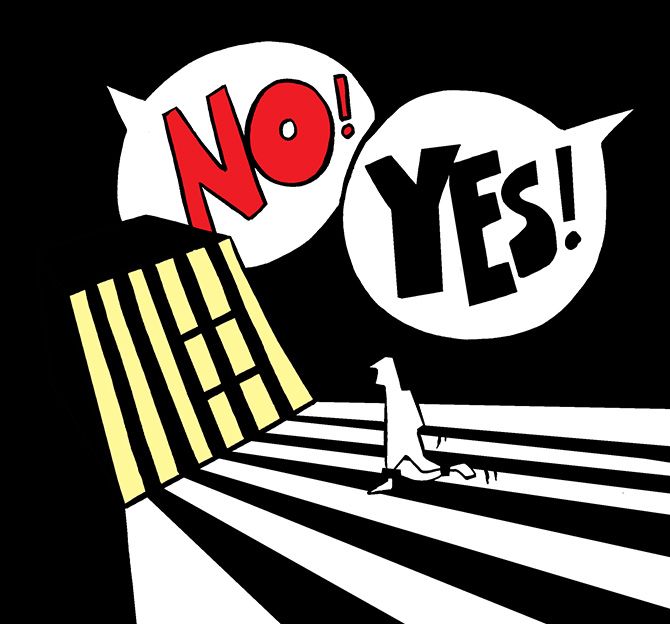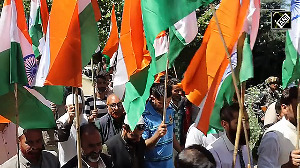Somehow, the sight of a specific person going to prison for a crime seems to warm many an Indian heart as compared with the sight of seeing the evidence stacked up against an accused just not withstanding judicial scrutiny, says Somasekhar Sundaresan.
Illustration: Uttam Ghosh/Rediff.com

The Allahabad high court set aside the conviction of the Talwar couple last month in the tragic twin murder of teenager Aarushi Talwar and domestic help Hemraj in Noida.
The high court ruled that the evidence was not adequate to secure conviction of the parents. The trial itself could have well qualified for mistrial in other jurisdictions going by the media coverage fed by the investigators and prosecutors, but that is now par for the course with any trial in India.
The same public drama that unfolded during trial erupted all over again after the verdict.
There are those who have no doubt that the parents are guilty of murdering their child. They have come up with cynical arguments such as: 'Therefore, nobody killed Aarushi'. Or, 'The court has only said evidence is inadequate. They are of course guilty'. Or, indeed, with statements such as, 'What a successful peddling of innocence through a book and a movie!'
Others, with a contrary disposition, make arguments such as: 'How could one even dream of accusing parents of murdering their child to begin with? There was no case here.'
In short, society is divided largely between those who believe the Talwars were guilty and those who believe they could never be guilty. Almost everyone has a certainty of belief stronger than what any eyewitness could harbour. Of course, there was none in this case.
While this is a physical criminal case involving murder, in the corporate-business-financial sector, such an approach of society is consistently universal.
In every single case, everyone in society has a clear view on who has done wrong, in what manner, and regardless of the judicial outcome through due process of law, theories of how justice was done or was not done mushroom.
In most financial sector laws, the enforcement folks do not even have to convince a court of law of their story -- they themselves can pass orders indicting an accused.
In appeal, it is the defence that is on trial -- the appellant has to convince the relevant tribunal that the order is not sustainable. Justice, in such circumstances, has become a matter of conspicuous consumption.
It is easy to assail a victorious appellant as someone who got away for want of proper evidence -- an alias for saying society will treat an accused as guilty even if courts do not believe her to be guilty.
Add to the mix, the practice of passing ex parte orders (orders passed without even a hearing) with clear and firm conclusions even before investigations are completed.
A regulator can take a public position, however wrong investigations may subsequently prove them to be, and pass orders imposing restraints on the suspect. Having done so, the process of a 'post-decisional hearing' and the suspect's efforts at getting the restraints removed necessarily entails the defence being put on trial.
The regulator gets a lot of mileage by attacking the credibility of the defence, without caring to first demonstrate the basis and validity of the unilateral ex parte order in the first place. In the eyes of society, that the state machinery has found fault with someone and believes that she has done wrong, is enough to make the suspect a convict.
Little wonder then that colourful use of language often seeks to make up for absence of articulated reasons in such orders.
Indeed, even in the Aarushi case, the trial judge who wrote the order buying into the prosecution story, is reported to have taken pride in an interview with Avirook Sen (author: Aarushi; the interview is set out in Sen’s book on the case) in how he flew down his son, whose command over English was put to use to write a good quality order.
No one can really predict what will eventually happen to the Talwars in the judicial process. A further appeal is likely to follow -- it may or may not succeed.
The Supreme Court will eventually rule. That court is necessarily right because it is final. It is not final because it is right.
Regardless of judicial outcome, sections of society have very clear and firm views on their guilt or on their innocence.
Worldwide, even after final rulings by supreme courts, convicts have been pulled out of prison or even out of death row because of relentless efforts by journalists and television documentaries, whose intrigue about a case refuses to let them accept what meets the eye and what is dished out to selective ears.
That a book even got written on this case in India, with an independent resolve to probe facts rather than re-hash the versions given by prosecutors, is the Indian media's saving grace.
That a movie-maker even took interest in a story of this nature to risk a commercial film on it is also not common.
For a movie like Talvar, that is accused of influencing the outcome in the appeal, there has also been a movie such as No One Killed Jessica, which spoke about accused being wrongfully absolved (unwittingly, the name has laid down a popular expectation that when there is a crime, if the accused has not done it, the crime never took place).
That movie too followed meticulous journalistic work proving how witnesses had lied during trial.
Somehow, the sight of a specific person going to prison for a crime seems to warm many an Indian heart as compared with the sight of seeing the evidence stacked up against an accused just not withstanding judicial scrutiny.
There is a nice coinage that has been developed for this concept: “collective conscience”.The concept was, for example, relied on to confirm the death sentence for an accused in the case involving the attack on Parliament, even while acknowledging that the evidence and the quality of trial was weak.
In other words, if a case shakes up society well enough to have its attention rivetted, the standard of justice would practically vary.
Therefore, the incentive for prosecutors and regulators is perversely weighed in favour of scandalising a case strongly enough for society’s attention to stay rivetted to the lurid details dished out, leaving it open to ignore facts and evidentiary standards.
Of course, whether someone going to jail or someone being let off is more acceptable for a society's collective conscience is a pointer to what kind of society we are as a collective.
Somasekhar Sundaresan is an advocate and independent counsel. Tweets @SomasekharS












